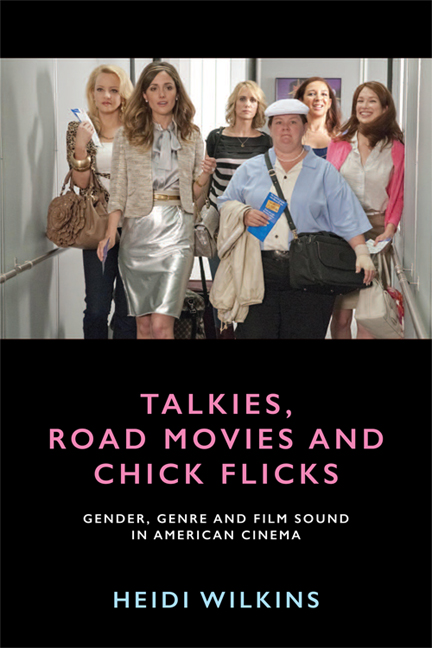Book contents
- Frontmatter
- Contents
- Acknowledgements
- Introduction
- 1 Talking Back: Voice in Screwball Comedy
- 2 All That Jazz: The Diegetic Soundtrack in Melodrama
- 3 The Alienated Male: Silence and the Soundtrack in New Hollywood
- 4 Brothers in Arms: Masculinity and the Vietnam War Movie
- 5 Subversive Sound: Gender, Technology and the Science Fiction Blockbuster
- 6 Girl Talk: The Postmodern Female Voice in Chick Flicks
- Conclusion
- Bibliography
- Filmography and Other Sources
- Index
1 - Talking Back: Voice in Screwball Comedy
Published online by Cambridge University Press: 05 August 2016
- Frontmatter
- Contents
- Acknowledgements
- Introduction
- 1 Talking Back: Voice in Screwball Comedy
- 2 All That Jazz: The Diegetic Soundtrack in Melodrama
- 3 The Alienated Male: Silence and the Soundtrack in New Hollywood
- 4 Brothers in Arms: Masculinity and the Vietnam War Movie
- 5 Subversive Sound: Gender, Technology and the Science Fiction Blockbuster
- 6 Girl Talk: The Postmodern Female Voice in Chick Flicks
- Conclusion
- Bibliography
- Filmography and Other Sources
- Index
Summary
During a rickety, uncomfortable bus journey that takes place in It Happened One Night (1934) the character of Oscar Shapely (Roscoe Karns) loudly exclaims, ‘there's nothing I like better than a high-class mama who can snap em back at ya!’ The ‘high class mama’ to whom he refers is runaway heiress Ellen Andrews (Claudette Colbert) and her ability to ‘snap em back’ refers to the speed at which she verbally retorts his wanton advances, throwing words back at him as quickly as he dishes them out – much to his delight. This instinct to verbally ‘snap back’ is a common trait of the screwball comedy heroine of the 1930s and 1940s and the ability to provoke these verbal retorts is a key function of the male characters. The skilfulness of actresses such as Claudette Colbert, Katharine Hepburn and Rosalind Russell to talk at speed was a key acoustic feature of these early ‘talkies’. Antagonistic relationships with their male counterparts, including actors such as Cary Grant and Clarke Gable, became a key narrative feature of the genre and the entertaining verbal battles that entailed were fundamental to the success of screwball comedy.
Emerging in the 1930s, screwball comedy became one of the first genres to achieve widespread success in the early sound period. The arrival of synchronised sound in Hollywood between 1926 and 1929 inevitably had a significant impact on cinema. Film had always been accompanied by sound in one form or another, but the ‘talkies’ introduced the prospect of a wider variety of film genres within mainstream narrative cinema that had not been possible during the silent era: genres that were reliant on language and verbalisation rather than mime and gesture. This development marked a change in film performance and acting style. As noted by Robert B. Ray: ‘Sound and the new indigenous acting style encouraged the flourishing of genres that silence and grandiloquent acting had previously hindered: the musical, the gangster film, the detective story, screwball comedy and humour that depended on language rather than slapstick.’ Although silent slapstick comedy remained in Hollywood, championed by the Marx Brothers, among others, the ‘talkies’ created great demand for a new generation of actors, those who could speak; it also generated a near-panic when these proved to be not that easily obtainable.
- Type
- Chapter
- Information
- Talkies, Road Movies and Chick FlicksGender, Genre and Film Sound in American Cinema, pp. 9 - 43Publisher: Edinburgh University PressPrint publication year: 2016



